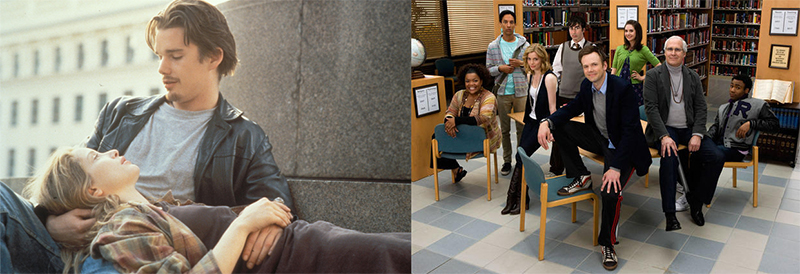Apart from my typing, with I swear is very good, a thing I like about my writing is something I also dislike – but I doubt I’ll ever stop.
Here it is. In the script I’m writing at the moment, I have a tiny moment when a drunk woman by Birmingham’s Broad Street nightclubs walks through our hero like he’s a glass door. It’s pretty good, I think: late night outside busy clubs so lots of dark and light plus she’s very drunk so you accept she doesn’t see him and you get that she doesn’t care.
This is my character’s most vulnerable point in the story so the symbolism of him finding himself accidentally in a ferociously busy place where he’s invisible and unwanted is, I believe, nicely striking.
Only, the drunk woman bothered me.
She does exactly what I need but the moment I say that to you, I realise she was a device rather than a character. Ultimately everyone in a script is a construct but you want them all to have life.
So actually I suddenly feel a tiny better about what I did. No, I like what I did, I just feel better that it’s something I keep doing.
Let me explain slightly quicker.
There’s a scene shortly afterwards where we’re back in Broad Street but it’s early the next morning. I think – no, I know – I am channelling the final scene in Before Sunrise where the film touches on locations we’ve seen, just now empty and in daylight instead dark and alive with that film’s Celine and Jesse.
Richard Linklater and Kim Krizan’s script for that scene says:
“…a series of shots of many of the locations CELINE and JESSE inhabited the night before. In the early-morning light those places are now somehow different. Even though there is little human presence at this time of the morning, the transformation has begun.”
In my case, my guy Richard has come under even more pressure overnight but it’s familiar pressure, it’s the kind of problem that he’s good at, so in an odd way he begins to climb back up.
New day, new world, I’m not saying this is the most original part of my script. I need it, I want it, I’ve made it this way but the uncontrollable itch is in this scene:
EXT. BIRMINGHAM – MORNING
Establishing. The outside of the Really Cheap B&B. Hagley Road. Broad Street’s cheap hotel. Jury’s Inn. The same DRUNK WOMAN asleep inside a curry house, face against the window.
That’s it. She’s back. Doesn’t do anything, doesn’t appear again and even in this moment Richard doesn’t notice her – but isn’t that right? Doesn’t that feel right to you?
I like the mirroring. I especially like that I got it organically, that I didn’t think What Will Mirror Last Night’s Scene.
I also just find it really, truly satisfying when moments connect together. When things aren’t just a good idea thrown in but they become part of the weave.
The trouble is that I cannot stop doing this. If something happens in a script of mine or if you meet a character, it is almost totally rock-solid certain that you’re going to see them again or it’s going to have an impact again.
I was asked about my bad writing habits the other day and this is one. I can definitely see that it’s because I also produce things: I want to make maximum use of every character, every extra, every location. And I do see that this is also actually quite limited of me.
But the satisfaction when this particular script knew I needed something and tapped me on the shoulder to remind me that I had this drunk character I could come back to, that is and was gold.
